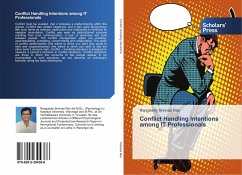Conflict must be avoided, that it indicates a malfunctioning within the groups. Conflict was viewed negatively, and it was used synonymous with such terms as violence, destruction and irrationality to reinforce its negative connotation. Conflict was seen as dysfunctional outcome resulting from poor communication, a lack of openness and trust between people. The conflict management styles are avoiding, accommodating, competing, compromising and collaborating. The styles of conflict assertiveness (the extent to which you want your goals to met) and cooperativeness (the extent to which you want to see the other party's concern met). Conflict - handling intentions is designed to measure a person's behavior in conflict situations. 'Conflict situations' are those in which the concerns of two people appear to be incompatible. In such situations, we can describe an individual's behavior along two basic dimensions.
Bitte wählen Sie Ihr Anliegen aus.
Rechnungen
Retourenschein anfordern
Bestellstatus
Storno








